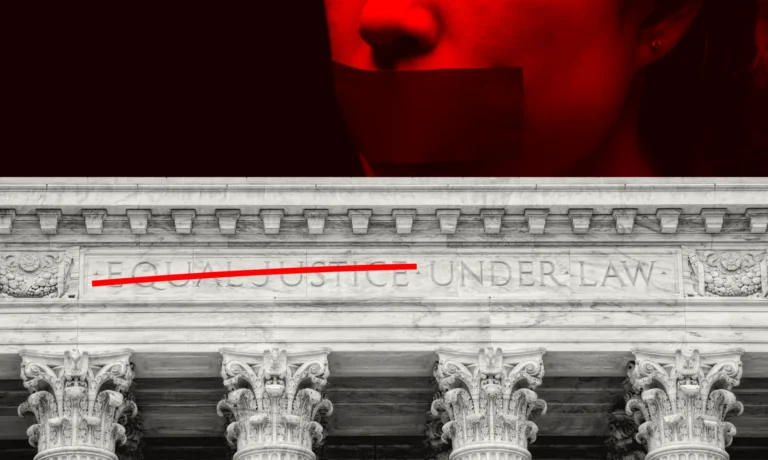WASHINGTON—The U.S. Supreme Court (SCOTUS) heard oral arguments today in the high-stakes age verification case Free Speech Coalition et al. v. Paxton, which involves the adult entertainment industry and the state of Texas. A decision is expected during the summer.
Lawyers representing adult industry stakeholders, led by the Free Speech Coalition, faced off with Texas Solicitor General Aaron Nielson, the representative for state Attorney General Ken Paxton, a far-right anti-porn Republican, who is defending the constitutionality of the state’s age verification law, House Bill (HB) 1181.
HB 1181 targets not only pornographic materials with age verification requirements but could also cover speech that isn’t pornographic by any legal standard but deals with sexuality, LGBTQ+ material, reproductive rights and other related topics accessible to minors on the internet through a cursory search on Google.
Road to SCOTUS
”We can protect children online without censoring the internet for adults,” said Alison Boden, executive director of FSC, in the joint statement. “There are smarter, more effective solutions to keeping kids from seeing adult materials that don’t violate the First Amendment right of consumers to go online anonymously.”
“The government cannot dictate what content we access online without meeting strict scrutiny,” added Brian Klosterboer, senior staff attorney with the ACLU of Texas.
The Oral Arguments
Derek Shaffer, an attorney for FSC, argued before the justices that HB 1181 is burdensome to protected speech and that it serves as a content restriction.
Shaffer urged SCOTUS to restore a preliminary injunction that was handed down by a federal district judge when the adult entertainment industry trade group initially sued in 2023. Keeping HB 1181 in effect under the Fifth Circuit’s use of rational review, he explained, “could open the door to an emerging wave of regulations that could imperil free speech online.” Despite the attempts by FSC’s counsel to keep the conservative majority on the focus of strict scrutiny, they seemed more focused on whether Texas has the right to regulate pornography and the accessibility of the content via the internet in the manner Texas House Bill 1181 prescribes.
Associate Justice Clarence Thomas, a conservative, asked Shaffer if any such age verification approach was constitutionally permissible. Shaffer replied, “I don’t think the court needs to close the door to that here, but it would need to be tailored age verification.”
Shaffer’s reply emulates the position long maintained by FSC and the porn companies in this case. That position is that the majority of the adult industry represented by the petitioners supports age verification and content filtering measures to prevent minors from viewing pornography and other age-restricted materials. However, they don’t support measures that significantly burden adults from accessing forms of speech that the First Amendment otherwise protects, like religion or the press.
Missing the Point
Despite the sentiments of strict scrutiny being applied to the law, the conservatives seem to have been more focused on the controversy of pornography itself.
Many of the more socially conservative justices couldn’t detach the sentiment that Texas is supposedly working to protect minors from efforts to censor speech the state government doesn’t like. Associate Justice Amy Coney Barrett, a conservative and outspoken Roman Catholic, questioned Shaffer, saying that content filtering measures that the adult entertainment industry has long touted and endorsed aren’t working and that stricter measures, like Texas HB 1181, might be necessary.
Barrett said, “Kids can get online porn through gaming systems, tablets, phones, computers. … Let me just say that content-filtering for all those different devices, I can say from personal experience is difficult to keep up with. And I think that the explosion of addiction to online porn has shown that content filtering isn’t working.”
Kavanaugh had a similar sentiment. He asked Shaffer, “Do you dispute the societal problems that are created both short-term and long-term from the rampant access to pornography for children?”
High Stakes
Attorneys for the American Civil Liberties Union (ACLU) and the union’s Texas chapter told reporters and activists last Wednesday, Jan. 8, over Zoom that the Texas law violates the First Amendment on several grounds, as noted several times throughout this analysis.
For example, HB 1181 could implicate evidence-based sexual education, pleasure products and other forms of sexual speech that aren’t pornographic.
“Meanwhile, Texas is arguing, and the [U.S. Fifth Circuit Court of Appeals] held, that the law is subject just to rational basis review,” said Vera Eidelman, a staff attorney for the ACLU and co-counsel representing the adult industry clients, during the press call.
Eidelman referred to how the Fifth Circuit applied a much lower burden of proof than strict scrutiny, which is the standard set by existing First Amendment case law to determine whether certain laws that restrict content or a group of individuals’ rights to freedom of expression are in the compelling interest of the government.
This was one of the common themes during the oral arguments today.
“That would be a serious departure from Supreme Court precedent. … It is not clear that it will not be limited to sexual materials,” Eidelman added in her statement during the Zoom press conference. “Again, this is really about how the government can regulate any speech it doesn’t like.”
Clear Censorship
Proponents of age verification laws, predominately Republican elected officials, have maintained that such laws are “reasonable” or “modest” as a means to protect minors from viewing age-restricted materials. However, the sentiments held by opponents are that these measures are content regulations and tools of censorship.
“We argue not only is the law subject to strict scrutiny but also that it fails,” Eidelman declared. “Because forcing adults to share personal and identifying information before they can access protected expression will obviously make people think twice before accessing websites and materials that they have every right to access.”
Robert Corn-Revere, a First Amendment litigator at the Foundation for Individual Rights and Expression (FIRE), was also on the press call. Corn-Revere is the lead counsel on an amicus brief filed on behalf of FIRE in support of the Free Speech Coalition, which outlines other speech implications of HB 1181 and age-gating laws.
Additionally, Lee Rowland of the National Coalition Against Censorship (NCAC) was on the call, expressing concern over the fact that information that is created for sex educational purposes could be blocked under Texas law and similar statutes.
Potential (Artificial) Winners
While the high court has yet to offer a decision, one stakeholder on the side of Paxton appeared very pleased with some of the justices being skeptical of FSC—namely, the Age Verification Providers Association (AVPA). The association represents the largest providers of age verification and age assurance technology.
“This hearing should prompt the adult industry to accept that age verification is inevitably going to be required in the U.S. and around the world, and work constructively with our members to deploy cost-effective, interoperable, tokenized age assurance to a common standard globally,” AVPA executive director Iain Corby told AVN.
The trade group has operations in the United States and the United Kingdom, and AVN has previously gotten Corby on record offering an olive branch to work with the Free Speech Coalition on age verification legislation that satisfies all parties.
However, Corby and AVPA’s actions have indicated differently.
These actions include AVPA aligning with far-right Christian nationalist groups and anti-porn campaigners. Despite this history, Corby told AVN that he still believes that the adult entertainment and online safety software industries can work together in good faith amid the oral arguments.
“We can campaign together to ensure regulators establish a level playing field, applying AV requirements equally to adult content within every site, app, or platform to prevent children [from] accessing it wherever it is found,” Corby said.
Many critics of the AVPA contend that age verification laws like HB 1181 create a government-mandated exploitative marketplace for age verification companies to be the winners, and pornography companies, including small- to medium-sized enterprises, are artificially made the losers.


